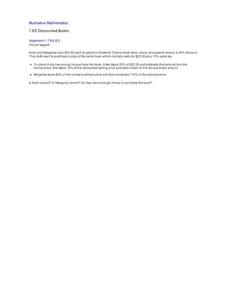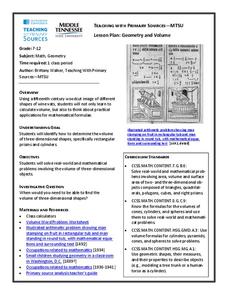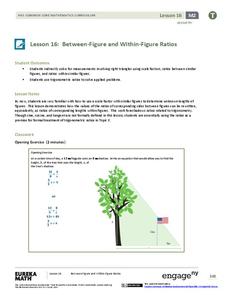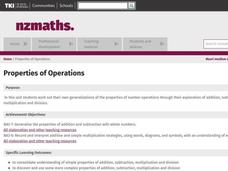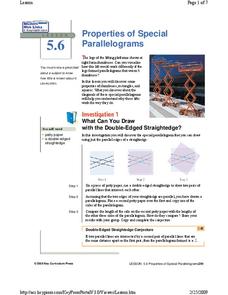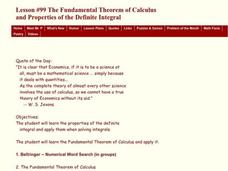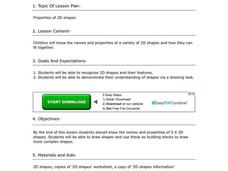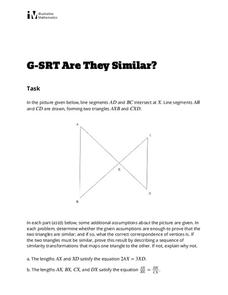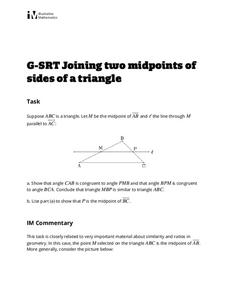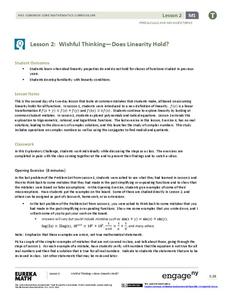EngageNY
Changing the Base
I can't calculate a base-2 logarithm since my calculator doesn't have a base-2 log key. Young mathematicians use the change of base formula to extend the properties of logarithms to all bases. Among these bases is the natural log base,...
Illustrative Mathematics
Discounted Books
Adolescents love to shop, especially when an item is discounted. Here, shoppers only have a set amount of money to spend. Will they be able to make a purchase with the discount and tax added in? Percent discounts can be calculated...
Baylor College
Water: Post-Assessment
Very simply, the science class will discuss what they have learned during The Science of Water unit and take a multiple-choice post-assessment quiz. A few other closing activities are suggested for you to choose from, such as having...
Virginia Department of Education
Geometry and Volume
The history of math is fascinating! Utilize a woodcut primary source image from 1492 and posters from the 1930s to help geometers apply their volume-calculation skills to real-life questions.
EngageNY
Between-Figure and Within-Figure Ratios
Tie the unit together and see concepts click in your young mathematicians' minds. Scholars apply the properties of similar triangles to find heights of objects. They concentrate on the proportions built with known measures and solve to...
EngageNY
Why Were Logarithms Developed?
Show your class how people calculated complex math problems in the old days. Scholars take a trip back to the days without calculators in the 15th installment of a 35-part module. They use logarithms to determine products of numbers and...
EngageNY
Markup and Markdown Problems
There is a 100 percent chance this resource will help pupils connect percents to financial literacy. Young mathematicians use their knowledge of percents to find markups and markdowns in financial situations in the seventh segment in a...
Virginia Department of Education
A Mystery to Solve
Investigate field properties of real numbers. Scholars use a table for a given operation to determine the identity element. They use the same table to find a missing value in an equation.
Curated OER
Properties of Circles
Students study the properties of circles. In this circles lesson, students read a word problem about circles. Students watch a video about the activity and then practice drawing the circle solution to the problem. Students watch another...
New Zealand Ministry of Education
Properties of Operations
Learners consolidate and extend understanding of simple properties of the four arithmetic operations. They use these properties as an aid to easy calculation. They discover and use some more complex properties of addition, subtraction,...
Curated OER
www.tutor-usa.com worksheet
Reinforces the use of the distributive property for the pre-algebra or the beginning algebra pupil. Multiple choice and short answer questions test the use of the distributive property in expressions using solely numerical values or...
Key Curriculum Press
Properties of Special Parallelograms
Rhombuses, rectangles and squares are have special properties. In this lesson, young geometers investigate and make conjectures about diagonals, angles, and parallel lines of parallelograms.
Curated OER
Math: Matching Rods and Religion
Math and religious studies are integrated together using using cuisenaire rods and Kid Pix for this problem-solving exercise. In pairs, they match different colored rods to represent various groups of people. Meanwhile, students at...
Curated OER
The Fundamental Theorem of Calculus and Properties of the Definite Integral
Students discuss the importance of fundamental theorems in math. In this calculus lesson, students define the fundamental theorem of calculus and discuss why it is so important they understand it. They work problems to model how this...
Curated OER
Properties of 2D Shapes
Second graders determine how to name two-dimensional shapes by their properties. In this two-dimensional figure lesson, 2nd graders work in two groups. They work with the teacher to examine two-dimensional shapes and complete a...
EngageNY
Adding and Subtracting Expressions with Radicals
I can multiply, so why can't I add these radicals? Mathematicians use the distributive property to explain addition of radical expressions. As they learn how to add radicals, they then apply that concept to find the perimeter of...
West Contra Costa Unified School District
Fractional Exponents and Property of Exponents
Don't just use a fraction of this resource ... use it all. Learners first investigate patterns to determine how to deal with fractional exponents. Individuals then evaluate expressions involving fractional exponents.
Illustrative Mathematics
Are They Similar?
Learners separate things that just appear similar from those that are actually similar. A diagram of triangles is given, and then a variety of geometric characteristics changed and the similarity of the triangles analyzed. Because the...
Illustrative Mathematics
Joining Two Midpoints of Sides of a Triangle
Without ever using the actual term, this exercise has the learner develop the key properties of the midsegment of a triangle. This task leads the class to discover a proof of similar triangles using the properties of parallel...
EngageNY
Wishful Thinking—Does Linearity Hold? (Part 2)
Trying to find a linear transformation is like finding a needle in a haystack. The second lesson in the series of 32 continues to explore the concept of linearity started in the first lesson. The class explores trigonometric, rational,...
Illustrative Mathematics
Regular Tessellations of the Plane
Bringing together the young artists and the young organizers in your class, this lesson takes that popular topic of tessellations and gives it algebraic roots. After covering a few basic properties and definitions, learners attack the...
West Contra Costa Unified School District
Multiplying Binomials and Factoring Trinomials
Two lessons for the price of one! Learners use algebra tiles to multiply binomials in the first lesson plan, Next, they use their knowledge from the first lesson plan to factor trinomials into two binomials.
Illustrative Mathematics
Logistic Growth Model, Abstract Version
Here learners get to flex some serious algebraic muscles through an investigation of logistic growth. The properties of the constant terms in the logistic growth formula are unraveled in a short but content-dense...
Willow Tree
Slope
Investigate the different types of slope using graphs and ordered pairs. Scholars use the slope formula to determine the slope of a line between two points. Includes examples with a slope of zero and with no slope. The lesson follows a...



